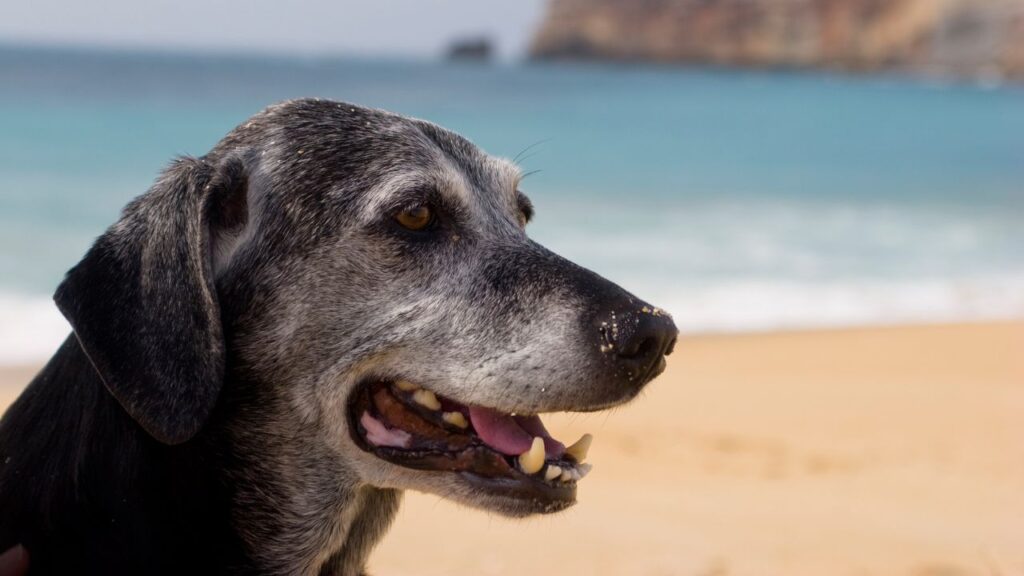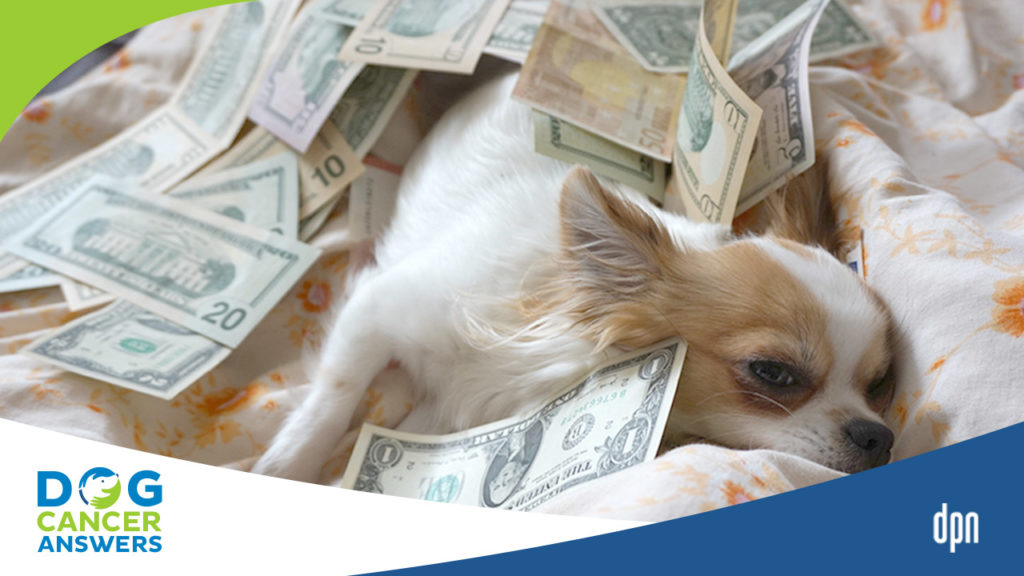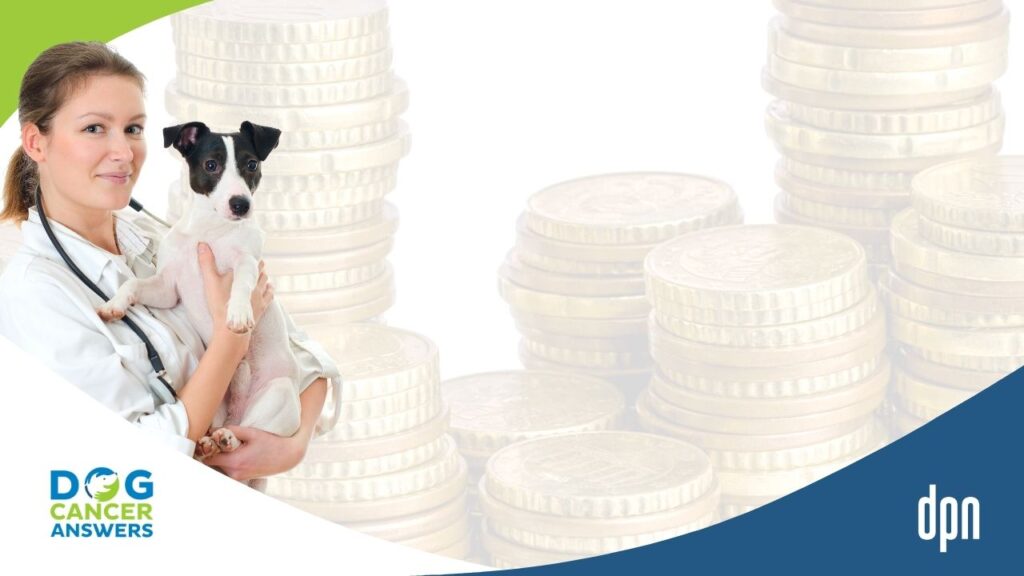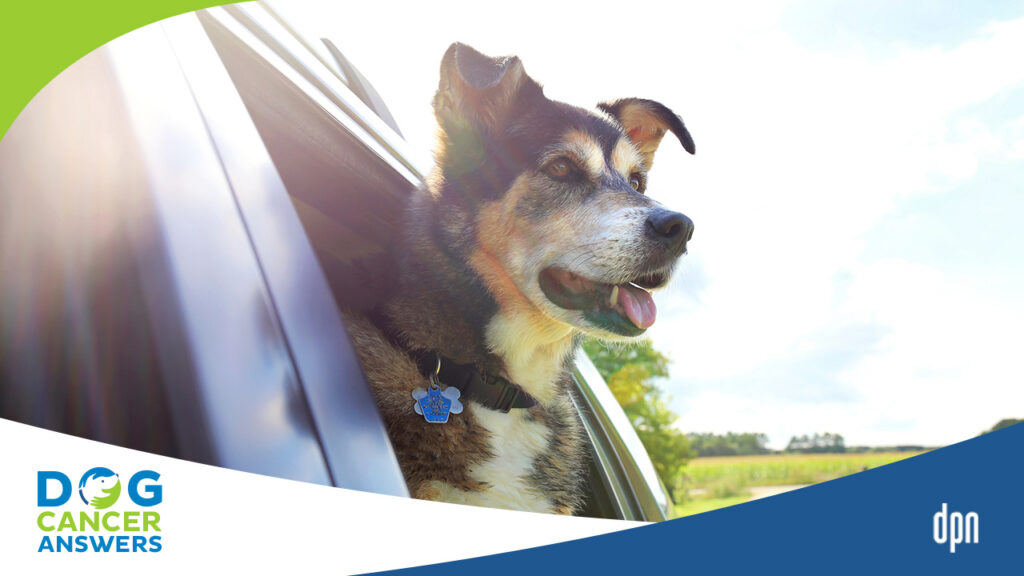EPISODE 46 | RELEASED April 17, 2020
When Not to Treat Dog Cancer │ Dr. Demian Dressler Deep Dive
Is it OK to not treat dog cancer? Dr. Dressler mounts a defense of guardians who have to make painful decisions about their dog cancer treatments.
SHOW NOTES
When it comes to dog cancer treatment cost is a big factor. But so are many other things. Dr. Dressler defends dog guardians who make choices for their dog’s best interest that other people disagree with. There is no “one right way” and he makes sure we all understand that in this thoughtful conversation with James Jacobson.
Dr. Demian Dressler is co-author of the book The Dog Cancer Survival Guide: Full Spectrum Treatments to Optimize Your Dog’s Life Quality and Longevity.
[00:00:00] >> Dr. Demian Dressler: So when you start violating the human animal bond with what you’re doing, it starts melting down. People start feeling really bad.
[00:00:07] >> Announcer: Welcome to Dog Cancer Answers, where we help you help your dog with cancer. Here’s your host, James Jacobson.
[00:00:15] >> James Jacobson: Welcome to Dog Cancer Answers. Today, we are exploring the question, when should I not treat my dogs cancer? Some people on social media are being shamed and attacked for the personal choices that they’re making regarding their dog’s cancer treatment decisions. The funny thing, funny, if you can call it funny is the shaming goes for every kind of choice. People who think that you shouldn’t use chemo, shame people who think that you should use chemo.
[00:00:43] On the other hand, people who decide to stop cancer treatments, get shamed by people who think they should keep going. Others are being criticized for their choices of what to feed their dogs or what supplement to choose, or even what type of veterinarian they should use. And speaking of veterinarians, how do you have that uncomfortable conversation with your vet if you decide that you want to stop or modify the prescribed treatment regimen? These can be difficult discussions, whether on Facebook or in face-to-face conversation with family and friends and your veterinarian. Our guest today wrote an article entitled, "Is It Wrong If I Don’t Want to Treat Dog Cancer?"
[00:01:24] Which is interesting, considering that our guest is known around the world as The Dog Cancer Vet. We are glad to welcome back to our microphones, Dr. Demian Dressler. He is co-author of the bestselling book, The Dog Cancer Survival Guide. He is a graduate of the Cornell School of Veterinary Medicine and has been in private practice since 1997.
[00:01:45] Dr. Dressler, welcome to the show.
[00:01:46] >> Dr. Demian Dressler: Thank you.
[00:01:47] >> James Jacobson: In your recent article, you write about when you should not treat your dog with cancer. Why would you, The Dog Cancer Vet, write an article like that?
[00:01:56] >> Dr. Demian Dressler: Well, I don’t know that it was necessarily a injunction or a request or a recommendation.
[00:02:04] >> James Jacobson: Okay.
[00:02:04] >> Dr. Demian Dressler: It was a clarification on, or commentary, on a phenomena today I had seen on social media. And that was that people were getting shamed for the choices that they were intelligently making concerning their dogs’ medical care in regards to cancer. And so I thought that that type of shaming was completely inappropriate and it made me very, feel very, I guess, defensive or protective of those people.
[00:02:30] >> James Jacobson: What was the shaming? I mean, tell me about the shaming.
[00:02:33] >> Dr. Demian Dressler: There were two things. One was in relation to the treatments that they had chosen, chemotherapy drugs among them. And then two, with the decision to halt treatment. And both of these were met in some cases, by certain people with criticism. And I felt that that was despicable and deplorable and totally, totally unacceptable.
[00:03:00] And one of the reasons is because I see people in many different walks of life. I talked to people calling from all over the place. I see people from all over the place. So we have a lot of different people out there who have dogs and dogs are treated in a lot of different ways. And the guardianship philosophies vary a lot between people. Some people will treat dogs like the most valued matriarch or patriarch of their family. And some people will treat dogs as dinner. That’s kind of the span really that we see on how people treat dogs.
[00:03:33] >> James Jacobson: And, and treatment of dog cancer also means different things to different people.
[00:03:38] >> Dr. Demian Dressler: That’s right. That’s kind of connected to what I was getting at there because these different people have different ideas as to what is appropriate.
[00:03:45] >> James Jacobson: Many years ago, people would get a dog cancer diagnosis and then the only logical thing was when do I put my dog down? So that’s clearly not treatment.
[00:03:55] >> Dr. Demian Dressler: Well, it depends on how you look at that.
[00:03:56] >> James Jacobson: Okay.
[00:03:57] >> Dr. Demian Dressler: So if our job as, you know, guardianship is to help our animal. If you look at people who are cancer victims and who are coping and struggling, and you look at areas of the globe where assisted suicide is allowed, we find that people will take advantage of that, not infrequently after appropriate counselling. And that’s a commentary on something that is humane for those people. And we know that it’s humane because the people are dying for it. No pun intended, they are dying and they’re hurting and they’re really unhappy. And one of the things that you get when you have chronic pain is depression and that’s a known phenomenon.
[00:04:37] And so their entire outlook become as painted black. And they become very sad people most of the time. And they have no hope because they have a chronic disease that has no cure. So in those countries where assisted suicide is legal, that is an act of kindness. And so by alleviating suffering, which is what you’re kind of supposed to do as a healthcare provider, you are actually providing a treatment because you are alleviating suffering in the euthanasia. So you could look at that as treatment, depending on how you would define that.
[00:05:05] >> James Jacobson: Okay. But would you say that that mindset has changed over the years in terms of like cancer, it’s, it’s just basically a matter of.
[00:05:13] >> Dr. Demian Dressler: Oh, like in comparison to kind of the old school, you know, and I’ve got a dog. I got the cancer. Well, let’s get the gun.
[00:05:19] >> James Jacobson: Yeah.
[00:05:20] >> Dr. Demian Dressler: Yeah. That’s changed.
[00:05:21] >> James Jacobson: Okay. So what do you mean by different treatment for different people?
[00:05:25] >> Dr. Demian Dressler: Okay. So cancer is particularly systemic metastatic cancer that’s throughout the body. We can just cut it out. Say, so you’ve got cancer cells in the body. It’s not like a bacterial infection where you can just take an antibiotic as an example or whatever and get rid of it.
[00:05:39] And that’s a crystal clear thing. It’s not like that. Well, there’s a whole spectrum of different things that you can do. And we talk about all those different things that you can do in The Dog Cancer Survival Guide, obviously. So which of those things is somebody gonna pick? Well, a treatment could be, and it’s still under the umbrella of treatment, well, you could do a dog cancer diet. That’s part of treatment totally ignored by conventional oncology, I have no idea why. We do it for kidney disease. We do it for liver disease. We do it for cognitive dysfunction, neurologic dysfunction. There’s prescription diets out there for each of these things. But for whatever reason, cancer, no, no prescription diet, no diet, but yet that’s a treatment.
[00:06:17] We could do apoptogens, things to support normal cell suicide. That’s the reason why I developed Apocaps for my patients, because we want cells in the body to have a normal suicide rate. And as it turns out, cells that are not killing themselves at the right time in the body are cancer cells usually. That’s not very good.
[00:06:34] So that’s a quote unquote treatment. So when we’re dealing with a disease that is best approached using a multimodal, full spectrum plan, you get the best outcomes. They already know this. They already know this at the Mayo Clinic and places like that, that are more progressive, by using a multiplicity of tools, all of which are under the umbrella of treatment, we are making the patient better. And by selecting one of those things, it’s not as if you’re not treating it, you’re doing one of the various things that you can do to make life quality and longevity better.
[00:07:07] >> James Jacobson: So what are some reasons that people wouldn’t treat?
[00:07:10] >> Dr. Demian Dressler: Well, that’s gonna vary substantially depending on not only the person, but on the case.
[00:07:14] So as an example, we talk about treatment plan analysis in the book. So what is that? That’s a way of looking at all of the different factors that go into the treatment equation because cancer treatment is not a black and white subject. There’s the many shades of gray. Part of treatment plan analysis would be how old is my dog in comparison to their expected life span without cancer?
[00:07:33] If you have a Neapolitan Mastiff whose average life span is nine years of age and they die at that point and you have a 12 year old dog with a aggressive malignancy, one way may choose to not do a lot of treatments that have the potential for serious side effects, because that would be a negative life quality and that dog has surpassed as expected survival time. Therefore, it would be really weird to get another two years of good quality life for that dog, because it’s probably gonna die of something else. Or the cancer. Whatever. It’s already, already pushing it. It’s like, how far can you artificially support an animal?
[00:08:10] You know, you can get all the way to where you’re doing life support and you say, well, I’m keeping them alive. I have a, I have a 150 year old person who’s sitting here on a machine with fluids going in and out, and we’re doing what we can to save this. Well, wait a minute. You know, that’s.
[00:08:24] >> James Jacobson: What his life quality after a while.
[00:08:25] >> Dr. Demian Dressler: That’s not good life quality. And you’ve created a zombie. And so we want to avoid that. And one way to do that is through again, treatment plan analysis and looking at what’s the anticipated life expectancy, and then integrating risks connected to, with the proposed treatment, with the gains in longevity, in the context of how old is this dog and how long it could it be expected to live anyway?
[00:08:47] >> James Jacobson: And that’s, you do a great job in the book of talking about that early in the book about this treatment plan analysis and looking at, and their charts and stuff like that for the longevity of dogs based on, based on breed.
[00:08:57] >> Dr. Demian Dressler: And body weight.
[00:08:58] >> James Jacobson: And body weight. What are some other reasons people might not treat? I know it’s expensive, the average cost that I’ve seen is like five to 8,000 dollars.
[00:09:06] >> Dr. Demian Dressler: For conventional care. Yep.
[00:09:08] >> James Jacobson: Yeah.
[00:09:08] >> Dr. Demian Dressler: Yeah. That’s for like chemo or radiation. Yep. So one thing that we have to realize is that our relationship with the animals as guardians is gonna be dictated a lot by who we are, and also by what our life circumstance is.
[00:09:20] So I have clients who live in their cars on the beach and bring me their pets and they pay in cash and they don’t have a lot because they can’t even support themselves well. They can’t take care of themselves, and as a matter of fact, their food money is going towards the dog’s veterinary care, and they’re not gonna, they’re gonna eat less like for awhile.
[00:09:43] And I also have clients who fly me around their private jets. So those are different people. They’ve got different resources. One’s ability to do medical care will be limited and constrained by one’s finances. And this is what got me so off about this shaming thing that was going on. Also, we cannot judge somebody’s circumstance.
[00:10:03] And you can’t do it by looking at the outside. And there’s also a responsibility of the person who’s disclosing information in a public forum that should also be kept in mind. You know, maybe you don’t want to necessarily broadcast what you’re doing in your life on a public forum and open yourself up for attack because, that you never know.
[00:10:20] >> James Jacobson: That’s good advice for everything as it relates to social media.
[00:10:24] >> Dr. Demian Dressler: Yeah, I guess so. Right? So maybe you have somebody who’s coping with their own physical ailments. I see this a lot in practice. You know, ’cause I take care of people’s pets over a long period of time. Guess what? There’s deaths in the family. People, people get cancer, you know, there’s all this stuff that happens.
[00:10:41] There’s businesses that collapse. There’s houses that get burned down. You know, I see all these people over the years and there’s times in life where they have to juggle dollars. You’re not going to starve your child, usually, because you have to do chemotherapy on your dog. Like sometimes it comes down to that choice and usually, in that case, the kid will win.
[00:11:04] And so everybody’s got different circumstances. So, I think it’s really tempting for a lot of us to kind of go on this fist pumping platform of self righteous indignation when we don’t really have an understanding of what’s going on in people’s lives.
[00:11:19] >> James Jacobson: Logistics play a role in that too. Sometimes you just can’t get to the vet or you have a job, or you just can’t do it, right?
[00:11:26] >> Dr. Demian Dressler: Yup. Yup. Yup. There’s the other demands. Uh, yup, work is one of them, for sure. Time is one of them. Resource allocation is really important. So people have limited bandwidths. Like they’ve got stuff going on in their lives and it gets more complex it seems by the decade, and you have attentional resources and that’s actually one of the reasons why in the book we talked about guarding the guardian. The guardian has to be kept in optimum shape as much as possible because the delivery of the care has to do with how well the guardian is doing. What’s the available bandwidth attention and all the rest of it? And so that’s one thing, logistics in terms of just time management and energy.
[00:12:02] Another thing is the dog. So it could be that the dog has separation anxiety. It could be that every time they go into the doctor it’s attacking people, and that’s a horribly traumatic experience for everybody, because you’ve got a guardian there, who’s trying to do the right thing. The dog is attacking everybody.
[00:12:16] Then what do you get? Then there’s guilt and shame and embarrassments and all that. And then the veterinarian has to potentially muzzle the dog, toss a blanket over it, give it a tranquilizer shot. The whole thing is just a total nightmare for everybody involved, and you got to desensitize them. Anyway, there are ways to get around it, but the point is that’s a bad experience.
[00:12:34] So maybe that guardian would not want that for the dog and for everybody else involved too. And so that would be another reason why, okay we’re, we’re not gonna do hospital care. We’re gonna do home care. Or something like that. So there’s all these different factors that go into that equation.
[00:12:48] >> James Jacobson: Okay. Dr. Dressler, this is a good point to take a quick break, but when we come back, I’d like to discuss what you would say to someone who’s at the point where they decide that they want to stop actively treating their dog with cancer. It’s a really important question, and we’ll ask that right after this.
[00:13:08] Dog Cancer Answers is brought to you by the best-selling animal health book, The Dog Cancer Survival Guide: Full Spectrum Treatments to Optimize Your Dog’s Life Quality and Longevity by Dr. Demian Dressler, who is our guest today, and Dr. Sue Ettinger, who is a veterinary oncologist in New York. And in a minute, I will tell you how to get their book at a discount.
[00:13:30] This book, I’m holding in my hands right now is heavy. It’s 500 pages. It covers so many things, including everything that you need to know about conventional veterinary treatments, surgery, chemotherapy, radiation, including how to reduce their side effects. The most effective nonconventional options, including botanical nutraceuticals, supplements, nutrition, and mind, body medicine, and the book also discusses how to analyze the options and develop a specific plan for your own dog, based on your dog’s type of cancer and your dog’s age or your financial budget and your time constraints, as well as your personality. The Dog Cancer Survival Guide is available wherever fine books are sold, both online and in physical bookstores.
[00:14:15] Now, if you’d like to help support this podcast, get The Dog Cancer Survival Guide right away, direct from the publisher. It’s available in paperback and there is free shipping to anywhere in the United States. There’s also an e-book edition that is under $10. The website to get either the paperback or the e-book or both, and I know some dog lovers who do get both, is www.DogCancerBook.com. And because you are a listener to this podcast, you can save 10% if you use the promo code PODCAST, when you check out. You will save 10%. The website again, DogCancerBook.com. Use the promo code PODCAST for 10% off. That is www.DogCancerBook.com.
[00:15:04] Welcome back. We are speaking with Dr. Demian Dressler. Let me ask you, what would you say to someone who’s been treating a dog with cancer and then because of money or time, or, or impatience, or just, they’re not seeing a lot of progress, they make the decision to stop doing this treatment?
[00:15:21] >> Dr. Demian Dressler: That happens. That happens.
[00:15:23] >> James Jacobson: That’s pretty common in your experience?
[00:15:24] >> Dr. Demian Dressler: Yeah. Well, yeah. I’ve got one right now who is like that. When I say I’ve got one right now, I mean, two days ago, I was talking to a client and that’s the exact circumstance. So this was a little Frenchie, little French Bulldog.
[00:15:35] >> James Jacobson: One of your favorite breeds. I know.
[00:15:37] >> Dr. Demian Dressler: Yup. Yup. Yup. Napoleon really cute. Right. They came to me for a second opinion and. That dog had undifferentiated oral tumor. So it was a really, really aggressive cancer in its mouth. And they were told two months, which was a reasonable expectation based on the published literature. This was somewhere around a year and a half ago. So that dog has demolished the odds.
[00:15:58] And the reason for that is because the owner, the guardian has been willing to be consistent and we’ve been doing some things that would maybe be considered a little bit more on the experimental side, but it’s worked in this dog. Totally demolished the published expectations. Totally. Anyway, so guess what?
[00:16:15] We just lost remission and the tumor started growing again and then I looked at her and I could see she was sad. She’s a bit stoic, but I could see that it was affecting her pretty badly. And the most recent thing that we had done had started making the dog nauseous and Napoleon had started running away from his guardian. That’s a problem. So when you start violating the human animal bond with what you’re doing, it starts melting down. People start feeling really bad. That’s a great time, if you’ve got no other options, to cut line on it, because the fundamental platform, which is the relationship between the dog and the human, the bond there, starts getting contaminated by what you’re doing to treat the disease and that’s the platform for everything when it comes down to dogs and people.
[00:17:00] >> James Jacobson: And so were there any words of advice you gave her to make her feel better about the decision to not treat?
[00:17:07] >> Dr. Demian Dressler: When people are not conscious of what they’re experiencing, the entire processing ability flies out the window. They can’t take an information because they’re coping with something internally. They don’t know what it is, and it creates a mental haze, and you can’t think at all hardly. And that’s again, one of the reasons like for the breathing exercises and all that, that we talk about in Dog Cancer Survival Guide is it’s part of the stress response in the brain goes into a mode that’s called heuristic thinking, which has rules of thumb, which are very oversimplified thought patterns that exclude a lot of relevant information because it’s like survival. Quick. Jump in the nearest hole. That’s part of the stress response. Right. But it could be that hole is full of scorpions, but we don’t care about that. Let’s just go in there because we’re running away from this hungry lion.
[00:17:50] >> James Jacobson: Yeah.
[00:17:50] >> Dr. Demian Dressler: So that’s an example of heuristic thinking. And so that’s what happens when we’re feeling emotional stress. And so in this particular case, it got a lot easier. And the reason why it got easier was because I realized, ’cause I could tell that she was feeling painful. And so I said, oh, are you feeling bad because you’re doing something that’s hurting Napoleon? As soon as I said that, her face relaxed.
[00:18:12] >> James Jacobson: Yeah.
[00:18:12] >> Dr. Demian Dressler: And it, it all went off the window. And so it wasn’t something I say, I was like giving her advice per se, it was just that the identification of the pain and the connecting the dots was enough to dissipate the internal tension and kind of the pain that was being housed inside of her psyche that was disrupting everything she was doing. And that’s why the guardian exercises are so important.
[00:18:35] >> James Jacobson: I just want to interrupt you, to let our listeners know that those exercises are in chapter two of your book.
[00:18:41] >> Dr. Demian Dressler: Uh huh. And so guardians can let go of experience and let go of these crippling and devastating emotional responses to a situation which for many of us appears to be fundamentally unfair. There’s a basic unfairness when it comes to things like cancer that people experience ’cause it’s like, God, why have you done this to me? Or whatever. Life, why have you done this to me, I’m experiencing this really crappy thing, and my cute little dog doesn’t deserve that?
[00:19:08] >> James Jacobson: Right.
[00:19:09] >> Dr. Demian Dressler: So there’s this, unjustness in the whole thing and that has to be addressed. Otherwise people experienced severe trauma and it messes things up for the animal too.
[00:19:19] >> James Jacobson: So you’ve done a good job I think of demonstrating how you, as a vet, are sensitive to that. But and earlier we talked about.
[00:19:28] >> Dr. Demian Dressler: I try.
[00:19:28] >> James Jacobson: Early, we talked about like, you know, social media shaming. Is there such a thing as vet shaming? Wherein someone tells their vet, they just don’t know.
[00:19:37] >> Dr. Demian Dressler: Yeah. Vets are people too, you know. Vets are people too, and I’m far from perfect I think when it comes to dealing with people at all moments of my day, like there are times when I look back and I said, God, I think I was acting like, kind of a jerk, right there. That’s not good. I need to try to fix that because the stressors that the veterinarians, who are also people, are experiencing on the other side of that equation sometimes rendered them ineffective and un-empathetic. So there’s a lot of people involved here and people are not perfect. So absolutely there’s vet shaming. For sure, there’s vet shaming because vets are human beings, just like you and me and human beings do things that are not that healthy sometimes. I mean, I think that’s one of the problems with the quote unquote institution of medicine is that it dehumanizes doctors. Probably one of the reasons why vets are all killing themselves now, because they’re putting a box of being incapable of something other than being perfect. They’re not perfect. So they go and they kill themselves. And so people, clients and vets both, are part of the same species. And so we see all of the various personality quirks in veterinarians as we do in every other group of people.
[00:20:47] >> James Jacobson: Well, it’s a very thoughtful piece. Check it out. There’s a link at our show notes for this episode, which is DogCancerAnswers.com/treatment. Dr. Dressler, thank you.
[00:20:58] >> Dr. Demian Dressler: Thank you.
[00:20:59] >> James Jacobson: I want to thank Dr. Dressler for that enlightening conversation. I hope you found it as helpful as I did. The guilt that we feel as dog guardians and dog lovers can be tremendous. Even the tiniest permission slip from authorities like Dr. Dressler, can help us calm down and accept what we need to do for our dogs.
[00:21:21] No one should be shamed for doing the best thing for themselves and their dogs. To read Dr. Dressler’s thought provoking piece on this topic, go to the show notes for this episode, which are hopefully in your podcast app, or definitely at the link DogCancerAnswers.com/treatment. That’s the quick link for the show DogCancerAnswers.com/treatment.
[00:21:47] Do you have a question for a dog cancer veterinarian? Well, one of our veterinarians can answer your question on a future episode of Dog Cancer Answers. Please call our listener line and record your question. It’s easy to do. The phone number, 24 hours a day, seven days a week to, leave a recording for one of our vets is (808) 868-3200. And we may use it on a future episode of Dog Cancer Answers.
[00:22:14] Speaking of our website, DogCancerAnswers.com, that is the place that you can go to listen to, or download our back catalog of episodes. It is the best way to get the information that you need to help optimize your dog’s life quality and longevity.
[00:22:29] And in a moment, I will tell you about our next deep dive episode about dog cancer diet. But first we’d like to thank our sponsor, The Dog Cancer Survival Guide book by Dr. Demian Dressler and Sue Ettinger. The book is available wherever fine books are sold, both online and in physical bookstores, there is a lot of how to make decisions about dog cancer treatments.
[00:22:51] In fact, there’s an entire section of the book dedicated to what Dr. Dressler calls, treatment plan analysis. If you’d like to help support this podcast, get the book today direct from the publisher. You can get the paperback with free shipping anywhere in the USA, or get the e-book for just 9.95. To get either the e-book or the paperback, go to this website, DogCancerBook.com. And because you’re a listener to this show, if you use the promo code PODCAST, you can save 10%. That website again, DogCancerBook.com. Use the promo code PODCAST for 10% off. That is www.DogCancerBook.com.
[00:23:36] Well, on the next episode of Dog Cancer Answers, we are talking to an oncologist, Dr. Sue Ettinger about diet and dog cancer. Dr. Sue used to be a skeptic about changing the diet of dogs with cancer, but she’s a skeptic, no more. You’ll definitely want to hear her perspective on the dog cancer diet and what you should be feeding your dog now. It may be considerably different than what you’re doing now.
[00:24:03] And so you’ll want to hear what a leading veterinary oncologist says about diet and what you should, and shouldn’t be feeding your pup. And the best way to make sure that you get that episode as soon as it drops is to subscribe to Dog Cancer Answers in Apple Podcasts or on your favorite podcast app or on Spotify also, as well as YouTube and pretty much everywhere that you would want to find the podcast.
[00:24:30] So I’d like to thank Dr. Demian Dressler for being our guest today. If you’d like to reach out to him directly, his website is VetInKihei.com. That is spelled Vet in Kihei, K-I-H-E-I.com.
[00:24:45] Until next time. I am James Jacobson. From all of us here at Dog Cancer Answers and the Dog Podcast Network, I wish you and your dog, a warm, Aloha.
[00:25:01] Thank you for listening to Dog Cancer Answers. If you’d like to connect, please visit our website at DogCancerAnswers.com or call our listener line at (808) 868-3200. And here’s a friendly reminder that you probably already know, this podcast is provided for informational and educational purposes only. It’s not meant to take the place of the advice you receive from your dog’s veterinarian. Only veterinarians who examine your dog can give you veterinary advice or diagnose your dog’s medical condition. Your reliance on the information you hear on this podcast is solely at your own risk. If your dog has a specific health problem, contact your veterinarian.
[00:25:38] Also, please keep in mind that veterinary information can change rapidly, therefore, some information may be out of date. Dog Cancer Answers is a presentation of Maui Media in association with Dog Podcast Network.
Hosted By
SUBSCRIBE ON YOUR FAVORITE PLATFORM
Topics
Editor's Picks
CATEGORY











